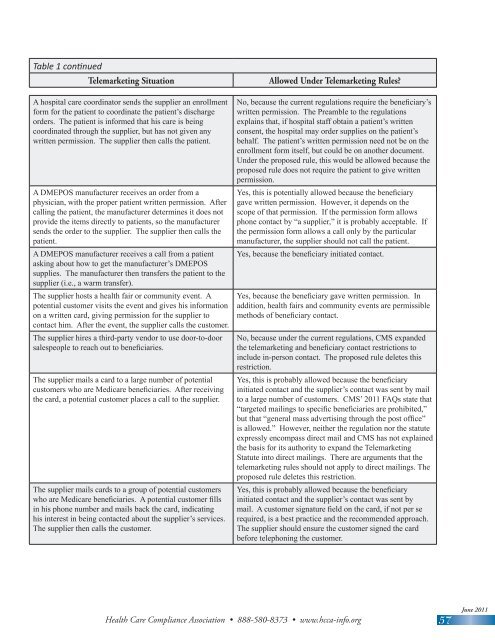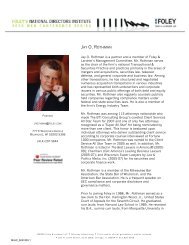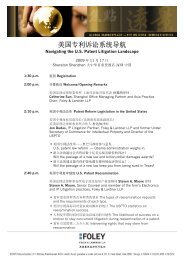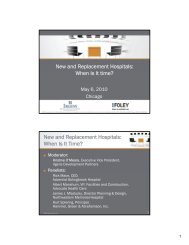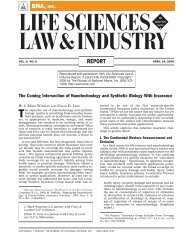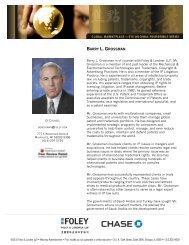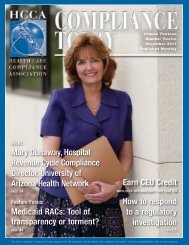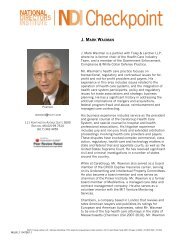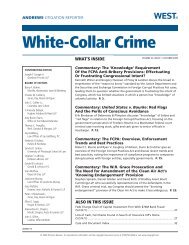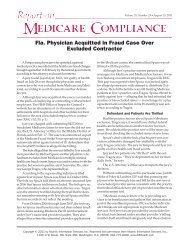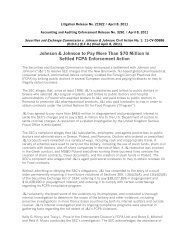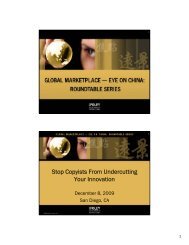Compliant DMEPOS Telemarketing - Foley & Lardner LLP
Compliant DMEPOS Telemarketing - Foley & Lardner LLP
Compliant DMEPOS Telemarketing - Foley & Lardner LLP
You also want an ePaper? Increase the reach of your titles
YUMPU automatically turns print PDFs into web optimized ePapers that Google loves.
Table 1 continued<br />
<strong>Telemarketing</strong> Situation Allowed Under <strong>Telemarketing</strong> Rules?<br />
A hospital care coordinator sends the supplier an enrollment<br />
form for the patient to coordinate the patient’s discharge<br />
orders. The patient is informed that his care is being<br />
coordinated through the supplier, but has not given any<br />
written permission. The supplier then calls the patient.<br />
A <strong>DMEPOS</strong> manufacturer receives an order from a<br />
physician, with the proper patient written permission. After<br />
calling the patient, the manufacturer determines it does not<br />
provide the items directly to patients, so the manufacturer<br />
sends the order to the supplier. The supplier then calls the<br />
patient.<br />
A <strong>DMEPOS</strong> manufacturer receives a call from a patient<br />
asking about how to get the manufacturer’s <strong>DMEPOS</strong><br />
supplies. The manufacturer then transfers the patient to the<br />
supplier (i.e., a warm transfer).<br />
The supplier hosts a health fair or community event. A<br />
potential customer visits the event and gives his information<br />
on a written card, giving permission for the supplier to<br />
contact him. After the event, the supplier calls the customer.<br />
The supplier hires a third-party vendor to use door-to-door<br />
salespeople to reach out to beneficiaries.<br />
The supplier mails a card to a large number of potential<br />
customers who are Medicare beneficiaries. After receiving<br />
the card, a potential customer places a call to the supplier.<br />
The supplier mails cards to a group of potential customers<br />
who are Medicare beneficiaries. A potential customer fills<br />
in his phone number and mails back the card, indicating<br />
his interest in being contacted about the supplier’s services.<br />
The supplier then calls the customer.<br />
No, because the current regulations require the beneficiary’s<br />
written permission. The Preamble to the regulations<br />
explains that, if hospital staff obtain a patient’s written<br />
consent, the hospital may order supplies on the patient’s<br />
behalf. The patient’s written permission need not be on the<br />
enrollment form itself, but could be on another document.<br />
Under the proposed rule, this would be allowed because the<br />
proposed rule does not require the patient to give written<br />
permission.<br />
Yes, this is potentially allowed because the beneficiary<br />
gave written permission. However, it depends on the<br />
scope of that permission. If the permission form allows<br />
phone contact by “a supplier,” it is probably acceptable. If<br />
the permission form allows a call only by the particular<br />
manufacturer, the supplier should not call the patient.<br />
Yes, because the beneficiary initiated contact.<br />
Yes, because the beneficiary gave written permission. In<br />
addition, health fairs and community events are permissible<br />
methods of beneficiary contact.<br />
No, because under the current regulations, CMS expanded<br />
the telemarketing and beneficiary contact restrictions to<br />
include in-person contact. The proposed rule deletes this<br />
restriction.<br />
Yes, this is probably allowed because the beneficiary<br />
initiated contact and the supplier’s contact was sent by mail<br />
to a large number of customers. CMS’ 2011 FAQs state that<br />
“targeted mailings to specific beneficiaries are prohibited,”<br />
but that “general mass advertising through the post office”<br />
is allowed.” However, neither the regulation nor the statute<br />
expressly encompass direct mail and CMS has not explained<br />
the basis for its authority to expand the <strong>Telemarketing</strong><br />
Statute into direct mailings. There are arguments that the<br />
telemarketing rules should not apply to direct mailings. The<br />
proposed rule deletes this restriction.<br />
Yes, this is probably allowed because the beneficiary<br />
initiated contact and the supplier’s contact was sent by<br />
mail. A customer signature field on the card, if not per se<br />
required, is a best practice and the recommended approach.<br />
The supplier should ensure the customer signed the card<br />
before telephoning the customer.<br />
Health Care Compliance Association • 888-580-8373 • www.hcca-info.org<br />
57<br />
June 2011


